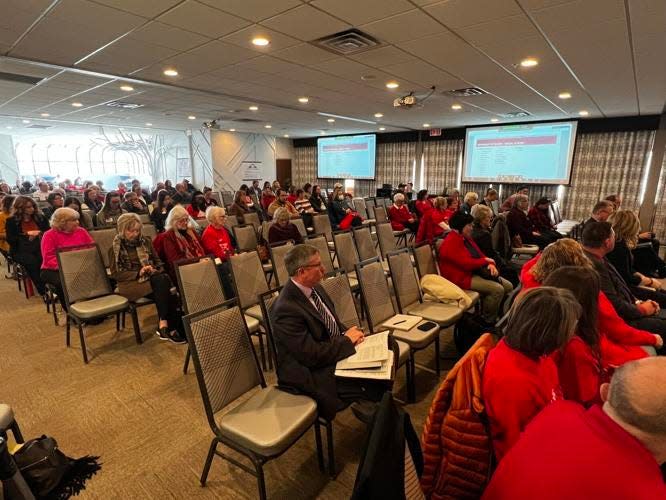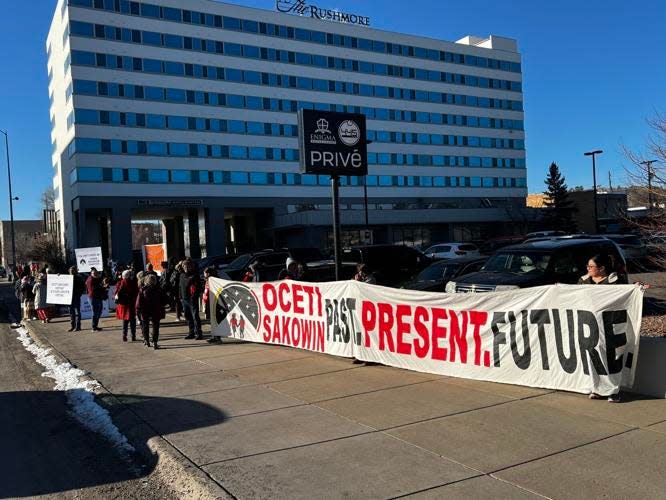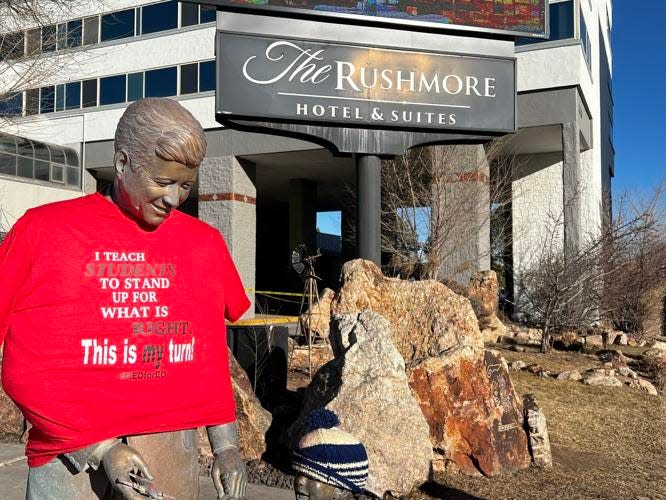More than 100 turn out for hearing on social studies standards
As the state continues to discuss a proposed revision to South Dakota's social studies standards, more than 100 people attended the third public hearing of the standards Friday at Rushmore Hotel in Rapid City.
Outside of the hotel, a group of Indigenous education advocates held a demonstration holding various signs and banners against the proposed standards.
During the hearing, impassioned testimony was heard from proponents and opponents of the rewritten standards, with 24 people speaking in favor and 26 people speaking against.

The hearing began with statements from those in favor of the standards. Dr. Ben Jones, state historian, previous Secretary of Education and a member of the Social Studies Content Standards Commission, was first to testify.
He cited a study from the Thomas B. Fordham Institute, an ideologically conservative think-tank that compares educational standards from around the country. Two other proponents were associated with the institute.
Jones pointed out that the institute's board and staff consists of Republicans and Democrats. After explaining the criteria the think-tank used, Jones said the current state standards, in place since 2015, earned a C- in civics and a D+ in U.S. history.
"The state that got A's were Alabama, California, Massachusetts, Tennessee, and the District of Columbia," he said. "The list of states with A's would indicate that they don't have a preference of red states or blue states. Both types are in their top five."
Jones said South Dakota schools were lacking in their social studies education and that something needed to change.
More: Gov. Kristi Noem replaces Aberdeen superintendent with local businessman on Board of Ed Standards
Greg Von Wald taught history and was president at Mitchell Technical Institute. He agreed with Jones' assessment and cited a study from the Institute for Citizens and Scholars, a New Jersey-based bipartisan nonprofit group that looks to promote democracy through higher standards.
"The 2018 study found 49 states had over half of their citizens fail the U.S. citizenship test. South Dakota had 52% of its citizens fail this test," Von Wald said. "The standards are good solid start and progress many of the flaws in our current social studies standards."
However, Von Wald also agreed with some of the opponents of the standards, seeking adjustments to elementary school expectations.
"They do need some modification at the lower elementary grade levels to reflect age appropriate material for world history," he said. "I hope these modifications can be made without the standards being rejected simply because local educators were not invited to the table."
A lack of historical proficiency of South Dakotans was much of the inspiration for the proponents. This is in response to the two previous hearings in Aberdeen and Sioux Falls, where opponents of the proposed standards said they were too challenging and rigorous for young learners.
Jon Schaff is a professor of government and the director of the Center for Civic Engagement and Public History at Northern State University. He was also a member of the Social Studies Content Standards Commission. Schaff said the proficiency statistics are proof that new standards need to be adopted.
"Given these distinct statistics, does anyone think that we should just do things the way we've always been doing them?" Schaff said. "I think that these standards, [if] well implemented, will play at least some part in making for a healthier democracy."
Opponents of the standards included a large contingency of teachers.
Christopher Bordeaux is the executive director of the Oceti Sakowin Education Consortium and has extensive background in elementary education and administration. He said the new standards violated an agreement to involve tribal leaders.
"There are so many things not right the social standards as presented. As many have stated, the processes set by the state of South Dakota Department of Ed violated of their own or federal laws," Bordeaux said. "The [Elementary and Secondary Education Act] states that the tribe be consulted if there are any changes that addressed the tribes and South Dakota."
Bordeaux said the new standards inadequately cover tribal history.
More: SDEA says new revision of proposed social studies standards still falls short
"High school students are required to know only one tribe in South Dakota but in the third grade, they have to memorize the preamble of the Constitution," he said.
Bordeaux said tribal sovereignty and tribal constitutions are not adequately addressed in the proposed standards. He said the standards do not address treaties and changes in culture since the nation's founding.
"We are mentioned as warlike, merciless Indian savages from the Declaration of Independence," he said. "None of the federal laws addressing Indigenous people are addressed."
A major aspect of a January revision draft was the inclusion of common historical Native American figures and Native American language.
Shaun Nielsen, a Rapid City Area Schools social studies teacher, was the only teacher included in the Social Studies Content Standards Commission. He said the revision was needed because the standards were derived by out-of-state interests.

"These standards were handed to us and the core content of the document did not come from South Dakota educators. At best, our commission was allowed to reword a sentence or move something to another grade," Nielsen said. "The mountain of opposition compared to the molehill of support is loud and clear. The people have spoken and there is no question of the course they wish to take."
Opponent Lynn Arnold asked for William Morrisey, the state-contracted author of the standards, to present himself at Friday's meeting. Morrisey is a retired professor from Hillsdale College — and private conservative institution in Michigan. The state paid Morrisey $200,000 to develop the standards.
After a quiet pause of which no one was acknowledged, Arnold reminded the board that the state also paid Morrisey $25,000 to facilitate the hearings though he was absent.
After the opponent section was completed, a rebuttal portion was conducted by Jones. During this time, Jones said the standards are not meant for students to memorize but for them to be familiarized with the concepts.
"That's why so much of the [proposed] elementary curriculum are exceeding the [current] standards at the elementary level. They are to get the students introduced to these people and places," Jones said.

He explained the spiraling structure of the standards. According to Jones, rehashing of previously-learned concepts, "is important to facilitate that memory recall."
The fourth and final hearing will take place April 17 in Pierre. Registration for public testimony is open.
Individuals wishing to register for the April hearing can do so by going to doe.sd.gov and following the public comment link via email and traditional mail.
Correction: A previous version of this story misspelled Shaun Nielsen's name. The story has been updated to reflect this change.
This article originally appeared on Sioux Falls Argus Leader: More than 100 turn out for hearing on social studies standards

